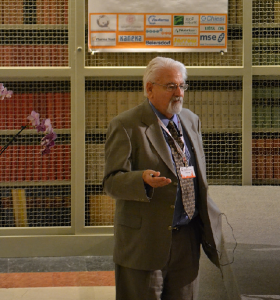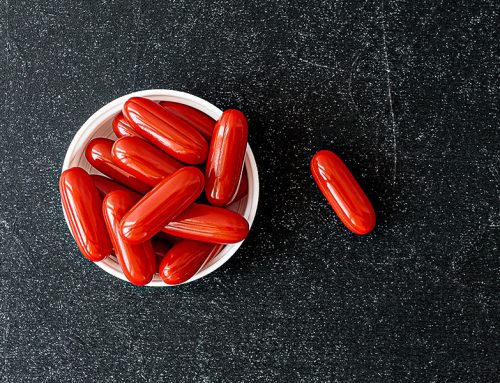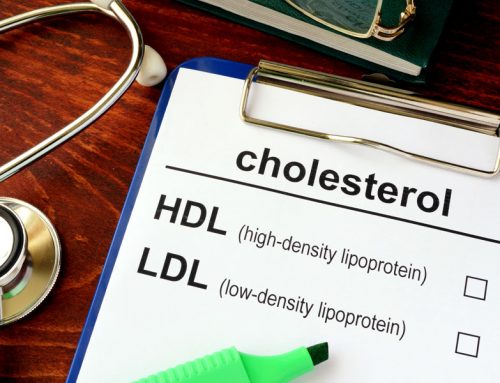
Dr. Svend Aage Mortensen (right), pictured here with Dr. Karl Folkers, was the lead researcher on the Q-Symbio study of the effects of Coenzyme Q10 adjuvant therapy for chronic heart failure patients. Now, Dr. Anne Louise Mortensen has focused in on the European patients in the international Q-Symbio study.
There are positive outcomes from an analysis of the European sub-group of chronic heart failure patients (n = 231 out of a total of 420 patients) in the international multi-center Q-Symbio study. Two years of adjuvant therapy and treatment with 3 times 100 milligrams of ubiquinone Coenzyme Q10 daily in addition to conventional heart failure treatment reveals [Mortensen 2019]:
- significantly fewer patients suffering major adverse cardiovascular events (= death due to heart attack or heart failure or hospitalization due to acute heart failure or pulmonary embolism) compared to placebo
- significantly fewer heart disease deaths and all-cause deaths compared to placebo
- significantly more improvements of the patients’ NYHA classifications compared to placebo
- significantly improved ejection fraction compared to placebo
What was the Q-Symbio study of CoQ10 and heart failure?
The Q-Symbio study was an international multi-center randomized, double-blind, placebo-controlled study that demonstrated that daily treatment with 3 times 100 milligrams of a pharmaceutical-grade ubiquinone Coenzyme Q10 preparation for two years in addition to conventional treatment significantly improved the symptoms and survival of chronic heart failure patients [Mortensen 2014].
420 patients from European (n=231), Asian (n=178), and Australian (n=11) centers were enrolled in the Q-Symbio study [Mortensen 2019].
The results of the study were published in 2014 in the American College of Cardiology speciality journal, Heart Failure.
Rationale for the adjuvant treatment of heart failure with CoQ10
The bio-chemical rationale for the adjuvant treatment with Coenzyme Q10 was to correct a deficit in heart muscle tissue CoQ10 concentrations that is thought to lead to compromised mitochondrial bio-energetics and compromised cellular antioxidant defense of the heart muscle tissue [Mortensen 2019].
Current medication therapy for heart failure patients mostly addresses complications caused by over-activated neuro-hormonal pathways; this therapy provides relief of symptoms and improves the patients’ prognosis. However, it does not address the underlying issue of cellular energy depletion in the heart muscle tissue [Mortensen 2019].
The beauty of Coenzyme Q10 supplementation is that the Coenzyme Q10 helps the cells and the mitochondria do better what it is that they should do: produce ATP energy.
Serum Coenzyme Q10 concentrations and heart failure
A major difference between the entire multi-center Q-Symbio sample and the European Q-Symbio sub-sample was that the serum CoQ10 concentrations of the European heart failure patients rose above 3.0 micrograms per milliliter and remained there throughout the course of the two-year study.
By contrast, the serum CoQ10 levels for the entire Q-Symbio sample rose from a baseline value of 1.14 micrograms per milliliter above 3.0 micrograms per milliliter at week 16 but dropped to 2.01 micrograms per milliliter by the end of the study at 106 weeks.
This discrepancy would seem to be evidence of considerable non-compliance among the heart failure patients in the non-European portion of the Q-Symbio study [Mortensen 2019].
The same pharmaceutical-grade ubiquinone CoQ10 preparation (Myoqinon, Pharma Nord ApS) was used at all centers [Mortensen 2014 online appendix].
CoQ10 blood levels in the European sub-group of Q-Symbio
In the European sub-group, the heart failure patients randomized to receive the active CoQ10 treatment had a serum CoQ10 levels of 0.95 micrograms per milliliter at baseline. Their serum CoQ10 levels rose significantly to 3.42 micrograms per milliliter at 3 months and to 3.55 micrograms per milliliter at 2 years [Mortensen 2019].
The European heart failure patients in the placebo group, on the other hand, had serum levels of 0.90 micrograms per milliliter at baseline. Their serum CoQ10 levels declined non-significantly to 0.82 micrograms per milliliter at 3 months and to 0.76 micrograms per milliliter at 2 years [Mortensen 2019].
The benefits of CoQ10 adjuvant therapy for chronic heart failure patients
The evidence from the data from the European sub-group of the multi-national Q-Symbio study confirms and enhances the original conclusion that adjuvant therapy with 3 times 100 milligrams of ubiquinone Coenzyme Q10 daily improves the symptoms and survival of chronic heart failure patients [Mortensen 2019].
Moreover, in the European sub-group, the improvement in ejection fraction in the CoQ10 treatment group was statistically significant when compared to placebo at 2 years (p=0.021)[Mortensen 2019].
The authors of the European sub-analysis posit the following explanations for the efficacy of the CoQ10 adjuvant treatment [Mortensen 2019]:
- improved cellular energy production
- increased cellular antioxidant defense
- improved stabilization of cell membranes and mitochondrial membrane transition pores
- improved endothelial function
- improved heart muscle contractility

Dr. William V. Judy, president of the SIBR Research Institute, collaborated with Dr. Karl Folkers in a study that demonstrated improved long-term survival in Coenzyme Q10 treated chronic heart failure patients compared to conventionally treated patients. Another of Dr. Judy’s studies showed that heart surgery patients supplemented with Coenzyme Q10 had a better recovery time and a better course of recovery.
Conclusion: CoQ10 adjuvant therapy for chronic heart failure
Coenzyme Q10 supplements are safe and well-tolerated, are affordable, and are associated with improved symptoms and survival in cases of chronic heart failure [Mortensen 2019].
However, not all Coenzyme Q10 products give the same absorption and bio-availability, not even if they are produced from the same raw material. It is always best to go with a CoQ10 supplement that has a documented absorption and bio-availability [Lopez-Lluch].
Please click here for more information about the benefits of Coenzyme Q10 supplementation
Read more about Coenzyme Q10 as an adjuvant remedy for Heart Failure
Sources
López-Lluch, G., Del Pozo-Cruz, J., Sánchez-Cuesta, A., Cortés-Rodríguez, A. B., & Navas, P. (2019). Bioavailability of coenzyme Q10 supplements depends on carrier lipids and solubilization. Nutrition, 57, 133–140.
Mortensen, S. A., Rosenfeldt, F., Kumar, A., Dolliner, P., Filipiak, K. J., Pella, D., & Littarru, G. P. (2014). The effect of coenzyme Q10 on morbidity and mortality in chronic heart failure: results from Q-SYMBIO: a randomized double-blind trial. JACC. Heart Failure, 2(6), 641-649.
Mortensen, S. A. (2015). Coenzyme Q10: will this natural substance become a guideline-directed adjunctive therapy in heart failure? Journal of The American College of Cardiology. Heart Failure, 3(3), 270-271.
Mortensen, A. L., Rosenfeldt, F., & Filipiak, K. J. (2019). Effect of Coenzyme Q10 in Europeans with chronic heart failure: A sub-group analysis of the Q-Symbio randomized double-blind study. Cardiology Journal, Published online 20 Feb 2019, doi: 10.5603/CJ.a2019.0022, retrieved from https://journals.viamedica.pl/cardiology_journal/article/view/CJ.a2019.0022.
The information presented in this review article is not intended as medical advice and should not be used as such.









Leave A Comment